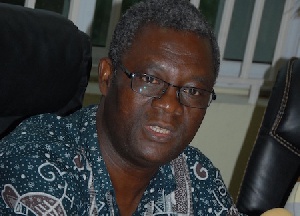Ghana’s development partners have expressed huge optimism in the ability of the Savannah Accelerated Development Authority (SADA), and have pledged their support co-operation to partner SADA to execute its mandate of social service delivery to bridge the yawning developmental gap between northern and southern Ghana.
In spite of the bad publicity, controversies and accountability deficits that marred the smooth operations of the programme in the past, the head of missions of the USAID and UNDP have pledged their support to partner SADA to deliver on its mandate. They made this known in Tamale at a stakeholders’ forum to deliberate on how to harmonise their activities to ensure the success of the programme.
The Director of Missions of USAID, Mr Jim Beever, who led the team which includes Mr Andy Karas, the Deputy Director of Missions of USAID; and Charles Sam, UNDP Country Director, noted that as development partners, they were impressed with the energy and frankness that characterised the deliberations, and pledged the unflinching support of his team to partner SADA. “We were impressed with the agreement by the board on how to move into the future.”
On whether the past negative experience of SADA can affect their disposition on the prospects of SADA, Mr Beever was emphatic that they are not going to judge SADA by its seeming dark past but on what opportunities SADA holds in unlocking the developmental opportunities of the north. “As a group, we did not come up here to judge the past; we came up here to embrace the future.”
According to him, the development of the north has huge prospects of impacting on the development of the country as a whole.
“If the north thrives, Ghana will thrive,” he noted.
The Chief Executive Officer of SADA, Mr Charles Abugri, noted that the deliberations was a success as it brought SADA and other partners into a more strategic relationship with the hope of ensuring strategic investment priorities within the area and also getting the best out of the investment already existing within the zone.
The SADA CEO further noted that the development partners are not focusing on the seeming dark past of SADA but on what opportunities the future holds for SADA.
According to the CEO, they have lessons to draw from the previous administration, and promised to provide quality leadership to the SADA team. Some of the factors they identified to have affected the operations of SADA had to do with the high expectation on the part of Ghanaians, which somehow was beyond the delivery capability of SADA, and inadequate internal control accountability systems. He, however, called on stakeholders to help manage the expectations on SADA, and called for support from the public to support the operations of the scheme. “The rate of expectations has the ability to promote SADA or disrupt our operations. Collectively, we should share a value to bring about change in our society.”
He was optimistic about the potential of agro investment as the key to unlocking the potentials of the SADA zone, and pledged SADA’s commitment to inject massive investment into the sector. “Support for agric is crucial to SADA and our development. If we don’t transform agric, we won’t be able to reduce poverty; we can’t increase household income, maximise our lands and water bodies.”
On her part, the Board Chairperson of SADA, Mrs Angelina Domakyaare expressed optimism in SADA potential and promised to work hard to address the challenges that militated against the past management of the programme. There is the need to invest in internal control accountability systems, undertaking internal reviews of the policies of the programme and managing the expectations of the public on delivering expectations far faster than the capabilities of SADA and the quality improvement in the staff strength of the programme.
”If we are able to get the computerised accounting system in place, it can help address the challenges. If the SADA zone is economically empowered, the overall GDP of the country will improve,” she noted.
The forum brought together all the major stakeholders, which include Alhaji Dr Mustapha Ahmed, Regional Ministers of the SADA Zone, MMDCES, Heads of corporations and some international development partners, which include the USAID team.
Business News of Sunday, 21 December 2014
Source: The Finder

















